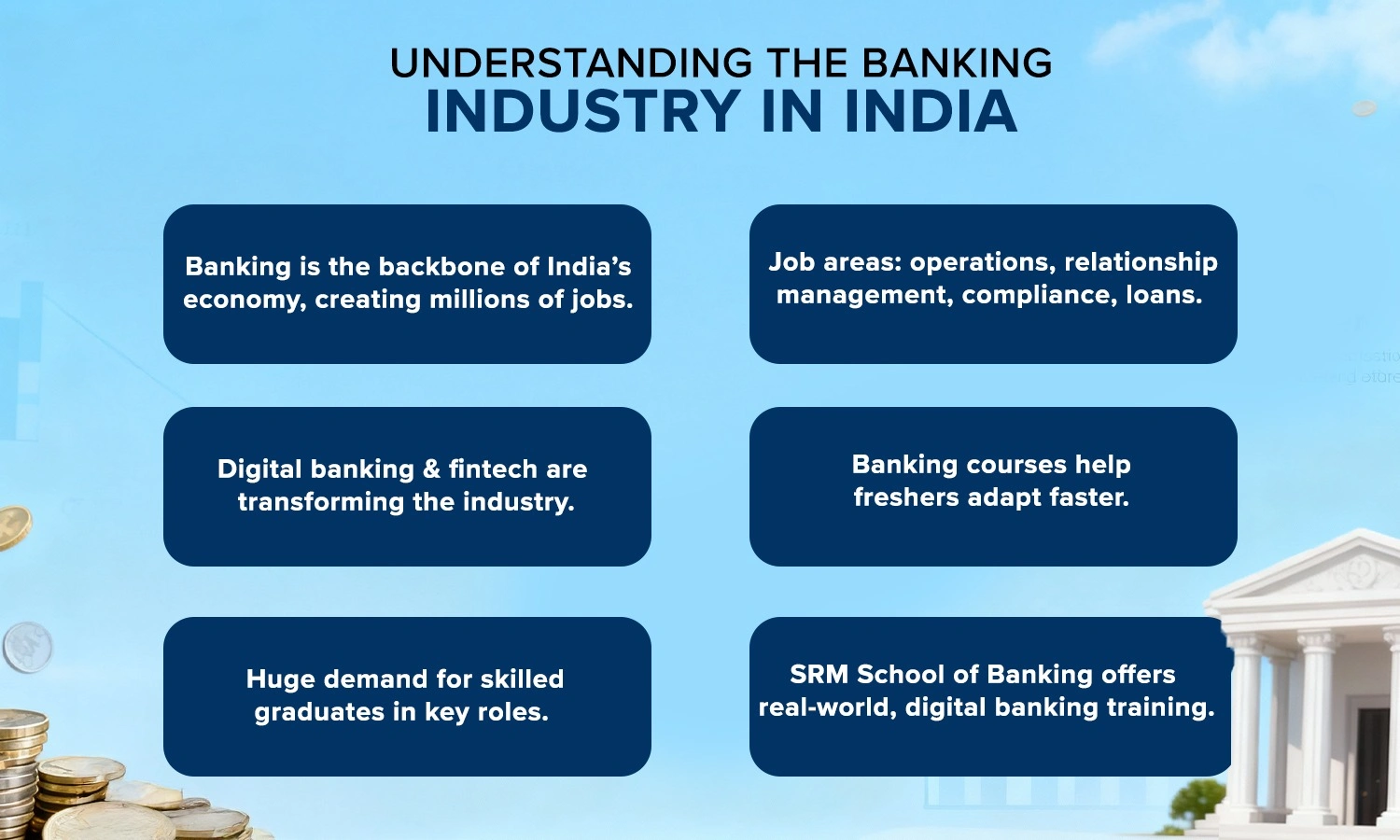Key Takeaways
- A bank job after graduation provides long-term stability and fast career growth.
- The right banking course enhances employability and industry readiness.
- SRM School of Banking’s intensive training programs prepare students for BFSI careers confidently.
Introduction
For fresh graduates, landing a bank job after graduation is one of the most stable and rewarding career paths in India. With a growing demand for skilled professionals in finance, digital banking, and customer management, the sector offers steady growth and job security. The key lies in choosing the right banking course after graduation that builds both technical and soft skills. SRM School of Banking bridges this gap through structured, Job-assured programs designed for real-world success.
Why Choose a Bank Job After Graduation
Choosing a bank job after graduation gives freshers a reliable career with strong financial rewards and growth potential. Career growth in the banking sector is expanding rapidly, driven by digitalization and financial inclusion initiatives.
Banking roles offer:
- Competitive salaries with annual performance bonuses.
- Job stability and a structured career ladder.
- Opportunities across retail, corporate, and digital banking.
Institutions like SRM School of Banking provide specialized training for graduates, ensuring they meet employer expectations and secure jobs in leading banks like HDFC, Axis, and ICICI.
Understanding the Banking Industry in India

India’s banking industry forms the backbone of the economy, employing millions of professionals every year. With the rise of digital banking, fintech integration, and customer-centric operations, there’s an increasing need for skilled graduates.
Freshers entering banking jobs can explore roles in operations, relationship management, compliance, and loan processing. A solid foundation through a banking course after graduation helps students adapt quickly to these dynamic roles. SRM School of Banking’s curriculum reflects the modern banking ecosystem, combining finance principles with hands-on experience in digital platforms and customer engagement.
Eligibility and Qualification for Bank Jobs
The qualification for bank jobs typically includes a bachelor’s degree from any recognized university. While commerce and finance graduates have an advantage, candidates from other streams can also apply after completing specialized banking and finance courses.
Essential eligibility criteria include:
- Age: 20–28 years for most private bank jobs.
- Skills: Strong communication, analytical ability, and digital literacy.
- Training: Completing a job -assured banking course enhances hiring prospects.
SRM School of Banking ensures that every student meets these qualifications through targeted skill development and industry-aligned training modules.
Step-by-Step Guide to Starting a Banking Career After Graduation

Here’s a simple roadmap for fresh graduates on how to get a bank job after graduation:
- Identify Your Career Goal – Choose between retail, digital, or corporate banking based on interest.
- Enroll in a Job-Focused Course – Opt for a program that includes internships, case studies, and job training support.
- Develop Core Skills – Build analytical, communication, and problem-solving abilities.Develop Core Skills – Build analytical, communication, and problem-solving abilities.
- Prepare for Interviews – Practice mock interviews and aptitude tests through guided sessions.
- Apply Strategically – Use your training cell or training institute’s network to access top bank job vacancies.
With SRMSB’s structured learning and job training assistance, fresh graduates can seamlessly move from classrooms to corporate banking floors.
Training Path: How an SRMSB Banking Course Prepares You for a Job
SRM School of Banking’s programs go beyond theory; they focus on employability. The Job assured course trains students in customer handling, loan processing, KYC, and compliance, ensuring they’re ready for recruitment.
Highlights include:
- Real-time banking simulations and case studies.
- Soft skills and communication development.
- Direct job opportunities with top BFSI institutions.
This career-driven approach equips students with the skills needed for a bank job and ensures they start earning immediately after course completion. SRMSB’s consistent effort in job records reflects its commitment to helping graduates achieve meaningful careers in the BFSI sector.
Enroll now and start your journey toward a secure future in the BFSI sector
FAQs
Typically 3–6 months, depending on the program structure.
₹2.5–₹4.5 LPA, with potential for performance-based incentives.
Yes, a banking course after graduation improves employability and job chances.
Absolutely — with a professional banking course for a job, any graduate can qualify.


